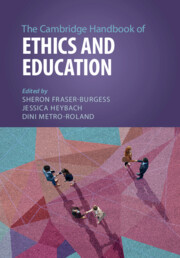Book contents
- The Cambridge Handbook of Ethics and Education
- The Cambridge Handbook of Ethics and Education
- Copyright page
- Epigraph
- Contents
- Figures
- Tables
- Contributors
- Foreword
- Preface
- Acknowledgments
- Part I Traditions in Ethics and Education
- Part II Ethics and Education in Practice
- 15 Why Educate?
- 16 The Displacement of Ethics in Education through Educational Standardization
- 17 School Health Policies and Practices
- 18 Value Creation and Happiness in Education
- 19 Children’s Rights, Childhood, and the Sovereignty of the Good
- 20 School Discipline and the Ethics of Punishment
- 21 Educating All Children
- 22 Decolonizing Curricula
- 23 The Political Necessity and Perilous Ambiguity of “Academic Freedom”
- 24 Teacher Activism and Ethical Speech
- 25 The Specter of Agreement
- 26 Philosophical Reflections on Ethics in Teaching and Teacher Education
- 27 The Ethical Dimension of Educating Educators
- Part III Emerging Ethical Pathways and Frameworks
- Index
- References
18 - Value Creation and Happiness in Education
Considerations for a Post-Truth World
from Part II - Ethics and Education in Practice
Published online by Cambridge University Press: 07 March 2024
- The Cambridge Handbook of Ethics and Education
- The Cambridge Handbook of Ethics and Education
- Copyright page
- Epigraph
- Contents
- Figures
- Tables
- Contributors
- Foreword
- Preface
- Acknowledgments
- Part I Traditions in Ethics and Education
- Part II Ethics and Education in Practice
- 15 Why Educate?
- 16 The Displacement of Ethics in Education through Educational Standardization
- 17 School Health Policies and Practices
- 18 Value Creation and Happiness in Education
- 19 Children’s Rights, Childhood, and the Sovereignty of the Good
- 20 School Discipline and the Ethics of Punishment
- 21 Educating All Children
- 22 Decolonizing Curricula
- 23 The Political Necessity and Perilous Ambiguity of “Academic Freedom”
- 24 Teacher Activism and Ethical Speech
- 25 The Specter of Agreement
- 26 Philosophical Reflections on Ethics in Teaching and Teacher Education
- 27 The Ethical Dimension of Educating Educators
- Part III Emerging Ethical Pathways and Frameworks
- Index
- References
Summary
Employing “Asia as method,” this chapter examines the twofold pedagogical practice of cultivating learners’ abilities to cognize truth and create value from it as the font of authentic happiness. The chapter first summarizes the intrinsic nature of sōka kyōikugaku, or “value-creating pedagogy,” in the work of Japanese educators Makiguchi Tsunesaburō (1871–1944), Toda Jōsei (1900–1958), and Ikeda Daisaku (b. 1928) and defines the concepts of truth, value, and happiness therein. It then considers the extrinsic relevance of these in the context of today’s politicized, semantic war on truth in the United States and the implications this has for modern notions of schooling and young people’s happiness. The chapter advances our understanding of value-creating approaches to knowledge, society, and power that increasingly inform the perspectives and practices of thousands of educators around the world and has significance for ethics in education.
Keywords
- Type
- Chapter
- Information
- The Cambridge Handbook of Ethics and Education , pp. 373 - 399Publisher: Cambridge University PressPrint publication year: 2024

